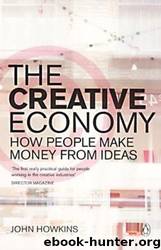The Creative Economy by unknow

Author:unknow
Language: eng
Format: epub
ISBN: 9780141910239
Publisher: Penguin Publishing
Published: 2009-02-05T16:00:00+00:00
THE ECONOMICS OF THE IMAGINATION
This chapter is about how to manage an idea and how to make a profit. There are people on both sides of the creative/management coin who believe ‘creativity’ and ‘management’ are incompatible, and creativity and economics mutually destructive. One of the tasks of management is to manage this tension; to make people more creative, not less.
Managing creativity starts with understanding the economics of creativity. It has to deal with two intertwined value systems. One is based on the physical products, the devices, carriers and platforms, that are tangible and behave much like any other physical material. The other is based on intellectual property, which is intangible and has some rather odd characteristics, as we have seen. Mainstream economics is well able to explain the former since they are similar to conventional manufactured goods and services. But it is hard pressed to explain the latter. For example, it can explain the manufacturing of a book in terms of the physical good but it is less adept at explaining the words and pictures inside. It is expert in the process of manufacturing a medical pill but not so good at the patent on which the value of the pill depends.
This is because ideas are ‘non-rivalrous’ in that I can have an idea and whether one or a million people also have it does not affect my having of it. In contrast, if I own or rent a space, nobody else can own or rent the same space; if I use some equipment, nobody else can use it. Whether an idea's non-rivalrous nature is a good thing or a bad thing, whether it enhances or destroys its economic value, depends on the management.
This non-rivalrous nature encourages ‘free-riding’, which means benefiting from another person's ideas without paying. People use free-riding to enhance their own knowledge and skills. Patent laws deliberately require ‘disclosure’ in order to ensure ideas are non-rivalrous and to encourage free-riding. From a supplier's viewpoint, the inevitability of free-riding shortens technological and product life cycles. Being first to market is a major advantage but an innovator has only a short time to establish a new product before others begin to compete. Some companies make a virtue out of necessity and under-price or give away their products, knowing that competitors will be able to move in quickly. Both these attributes apply to ideas in all industries, but their effect is multiplied when the idea is the product.
When an intangible idea is embodied in a tangible product, it becomes highly rivalrous. We can share the same song, but we cannot share the same copy. The whole point of copyright and patents is to restrict access, either absolutely or for a price. In order for some people to benefit, others must go without. Economists fiercely debate the social utility of this exchange. Some say that any constraint on ideas hampers creativity, drags down economic development, and is a misallocation of resources. Others say that some kind of monopoly is necessary to reward innovation and that monopolies are a good means of allocating resources.
Download
This site does not store any files on its server. We only index and link to content provided by other sites. Please contact the content providers to delete copyright contents if any and email us, we'll remove relevant links or contents immediately.
Call Me by Your Name by André Aciman(20465)
Ready Player One by Cline Ernest(14615)
How to Be a Bawse: A Guide to Conquering Life by Lilly Singh(7456)
Wiseguy by Nicholas Pileggi(5743)
The Kite Runner by Khaled Hosseini(5150)
On Writing A Memoir of the Craft by Stephen King(4910)
Audition by Ryu Murakami(4909)
The Crown by Robert Lacey(4784)
Call me by your name by Andre Aciman(4659)
Gerald's Game by Stephen King(4622)
Harry Potter and the Cursed Child: The Journey by Harry Potter Theatrical Productions(4483)
Dialogue by Robert McKee(4370)
The Perils of Being Moderately Famous by Soha Ali Khan(4203)
Dynamic Alignment Through Imagery by Eric Franklin(4199)
Apollo 8 by Jeffrey Kluger(3688)
The Inner Game of Tennis by W. Timothy Gallwey(3641)
Seriously... I'm Kidding by Ellen DeGeneres(3620)
How to be Champion: My Autobiography by Sarah Millican(3577)
Darker by E L James(3502)
